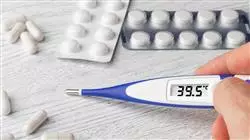University certificate
The world's largest faculty of medicine”
Description
Fever is one of the main symptoms of infectious diseases, so it is essential to act rigorously to reduce it. Train with us and increase your skills in this field"

Fever is one of the main symptoms caused by infections, as the body tries to fight the microorganisms that cause it by raising the body temperature. However, this survival mechanism generated by the body itself must be treated by professionals to avoid major consequences in patients, so that early action can improve their condition quickly and effectively.
In order to offer a complete training on this aspect to doctors working in the Emergency Room, in TECH we have designed this course, developed by elite professionals in the health area, with the aim that doctors learn how to act at all times. Specifically, the agenda deals with aspects as varied as: the initial approach in acute febrile syndrome, antimicrobials, or the management of fever in different types of patients, according to their own pathologies, among other aspects.
Thus, this very complete training, which has been developed by a team of specialists in the field, will help students to improve their professional skills, obtaining a superior training that will allow them to achieve professional success.
In addition, this course has the advantage that, being a 100% online training, the professional will have the ability to decide when and where to study, without commitments or obligations, thus being able to combine their study time with the rest of their daily obligations.
Don't miss the opportunity to specialize in this highly demanded field in the emergency room. You will be able to improve your training and daily work"
This postgraduate certificate in Febrile Syndrome and Fever in the Emergency Room contains the most complete and up-to-date program on the market. The most important features of the program include:
- Clinical symptom cases presented by experts in the field
- The graphic, schematic, and eminently practical contents with which they are created provide scientific and practical information on the disciplines that are essential for professional
- Therapeutic developments on intervention in infectious diseases
- Practical exercises where self-assessment can be used to improve learning
- An algorithm-based interactive learning system for decision-making in the clinical situations presented throughout the course
- Special emphasis on research methodologies
- Theoretical lessons, questions to the expert, debate forums on controversial topics, and individual reflection assignments
- Content that is accessible from any fixed or portable device with an internet connection
This postgraduate certificate is the best investment you can make in the selection of an up-to-date program for two reasons: in addition to updating your knowledge of Febrile Syndrome and Fever in the Emergency Room, you will obtain a postgraduate certificate from: TECH”
Its teaching staff includes a professionals from the field of medicine, who bring the experience of their work to this training, as well as recognised specialists from leading scientific societies.
The multimedia content, developed with the latest educational technology, will provide the professional with situated and contextual learning, i.e., a simulated environment that will provide an immersive training experience designed to train for real-life situations.
This program is designed around Problem Based Learning, whereby the physician must try to solve the different professional practice situations that arise during the academic year. For this purpose, the professional will be assisted by an innovative interactive video system created by renowned and experienced experts in fever management and extensive teaching experience.
Increase your decision-making confidence by updating your knowledge through this program"

We offer you the best teaching methodology and a multitude of practical cases that will make studying easier"
Objectives
The postgraduate certificate in Febrile Syndrome and Fever in the Emergency Room is oriented to facilitate the performance of the physician dedicated to the treatment of urgent infectious pathologies in all areas, but, especially in the emergency room.

Get trained using the latest educational technology, to contribute with quality and safety to decision making and patient care"
General Objectives
- Provide the theoretical knowledge necessary to understand the environment in which professional care is given to patients with infectious diseases
- Provide the appropriate treatment in the different cases of infectious diseases
- Gain in-depth understanding of the areas in which professionals must be trained, in order for them to be able to provide the best practice when treating infectious diseases
Specific Objectives
- Explain the biomarkers used in the clinical diagnosis of infectious disease
- Define the use of C-reactive protein and procalcitonin in the diagnosis of infectious diseases
- Define the practical use of non-specific tests for infectious evidence
- Explain the initial focus in Acute Fever Syndrome
- Define the action taken in cases of Bacteremia, Sepsis and Septic Shock
- Explain how to activate the Sepsis Code
- Define the use of different antimicrobials in Fever Syndrome
- Describe the characteristics of the different types of antimicrobials
- Define the implications of antimicrobial resistance when selecting treatment
- Explain the basic steps in the selection of antimicrobials according to the type of host and other extrinsic or environmental factors
- Explain the concept of empirical antibiotic therapy
- Describe how to act in the case of beta-lactam allergy
- Describe the use of antimicrobials and renal function
- Explain the relationship between fever and the presence of exanthema
- Explain the relationship between fever and the presence of adenopathies
- Fever and hematological alterations
- Explain the association of fever with altered level of consciousness
- Describe fever management in an elderly patient
- Describe fever management in a patient in a hemodialysis program
- Describe fever management in a patient with intravascular devices
- Describe fever management in a patient with a HIV infection
- Describe fever management in a patient with iatrogenic immunosuppression
- Describe fever management in a patient with oncohematological pathology
- Describe fever management in a patient with febrile neutropenia
- Describe fever management in a patient in the solid organ transplant patient
- Explain the implications of cytomegalovirus and BK virus infections in transplant recipients
- Describe fever management in a patient who has recently undergone surgery
- Describe the current management of infection of surgical wounds
- Explain the management of other infections in a patient who has recently undergone surgery
- Describe fever management in a pregnant patient
- Explain the use of antibiotic therapy in pregnancy

A unique, key and decisive training experience to boost your professional development"
Postgraduate Certificate in Fever and Febrile Syndrome in the ED
Febrile syndrome and fever are common medical conditions frequently encountered in the emergency setting. It is important to keep in mind that fever in itself is not a disease, but a symptom that indicates that something is not working properly in the body. In order to broaden the knowledge of professionals interested in working in this field, TECH Global University has developed a complete Postgraduate Certificate in Fever and Fever Syndrome in Emergencies. An online postgraduate course of the highest level, which is presented as a unique qualification opportunity to take your skills to the next level. This completely online program will add to your curriculum the most updated competencies in the market so that you can perform effectively in the field of febrile syndrome and fever in the emergency area. In this Postgraduate Certificate, we will provide you with the necessary knowledge to understand, evaluate and effectively treat patients with these conditions. With an interdisciplinary approach, we will analyze the causes, clinical manifestations and the most up-to-date management strategies.
Be a Postgraduate Diploma in treating febrile syndrome and fever in the emergency department.
At TECH we have highly qualified teachers with extensive experience in the area of emergency medicine. During the theoretical and practical sessions, taught in 100% online format, you will learn the basic fundamentals of the pathophysiology of febrile syndrome and fever, as well as the response mechanisms of the human body in these situations. In this Postgraduate Certificate, we will address the most current therapeutic approaches to the management of fever and febrile syndrome. We will discuss the rational use of antipyretic drugs, antimicrobials and other therapeutic options, taking into account the individuality of each patient and the possible associated complications. We will also explore the different etiologies of fever, including infectious and non-infectious, and the most relevant diagnostic techniques for each case. At the end of the Postgraduate Certificate, you will be prepared to efficiently and safely face the challenges involved in the management of febrile syndrome and fever in an emergency setting. You will obtain the necessary tools to provide optimal care to your patients and make informed decisions based on current scientific evidence.







